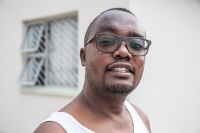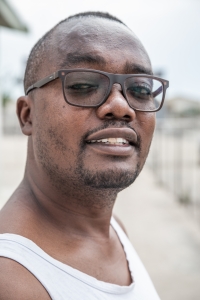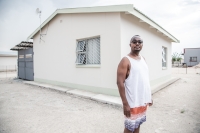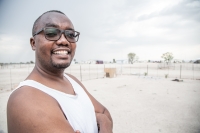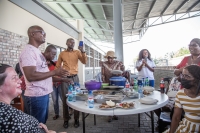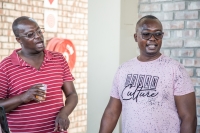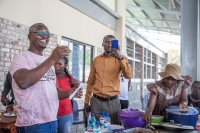"How would you describe that camp for the Czechs, who cannot imagine it?" - "That camp? A typical one, well. So. it was a camp, a typical camp. Like you just have tents there, because we had a lot of tents there. But with my mother, where we were, it was not a tent, it was wooden... there were many such wooden houses built there. And then a lot of tents, right? I would say a lot of people lived in tents. And then these wooden houses. But the clinic was a bit more modern back then, right? It was built out of brick and all that. There was a clinic and a school which we attended too. That was from brick. And then I also remember a prison. There was a small prison, yes, it was made of brick too. Well, it was also... well, but the village was deep in the forest, right? That was a deep forest, right? A normal person wouldn't find a way there, right? Because it's somewhere in the middle of the woods, right? I remember, we always went to that deep forest to pick up fruits just like that. And back home again in the evening. And they always yelled at us that we weren't allowed in the deep forest, but it was fun for us boys back then too. So, there was a lot of water, a lot of animals, right? There used to be a lot of pigs, right? We were there in that camp... pigs were bred a lot, like for meat, right? And there were cows and such... And lots of vegetables, right? We were in that camp in Zambia... I'll tell you, there was no hunger there. Back then. When there was a war. Even to this day I think the best food was at that camp, right? Especially vegetables over there in Zambia, right? That was absolutely divine, wasn't it? I still remember it to this day. And lots of fish. They ate a lot of fish there, fresh fish normally from the river, yeah, and stuff like that. And we grew up as children in that camp as simply brothers and sisters. I can say this because... And every elder there, every elder person there... we just took them as parents, right? Every elderly person was just like family to us. We took them all simply as our mothers or our fathers. And mostly they were all soldiers. But even we, as children, we were treated like little soldiers. But we were not like in the army, but we were like pioneers. Yeah? They always prepared us for the worst, right? Because of course, we were in a time of war. Zambia didn't have it easy either. Yeah? We were in Zambia as refugees, but there was a threat to Zambia again that the South Africans could also raid the camp, so they always gave us some sort of training there, right? We practiced every morning, they trained us. But we did not engage as if in a war. But they were preparing us for the worst. And it was a blast for us boys. That was a blast! Because it was an experience for us, right? We experienced it as children and it was really nice, right?'

